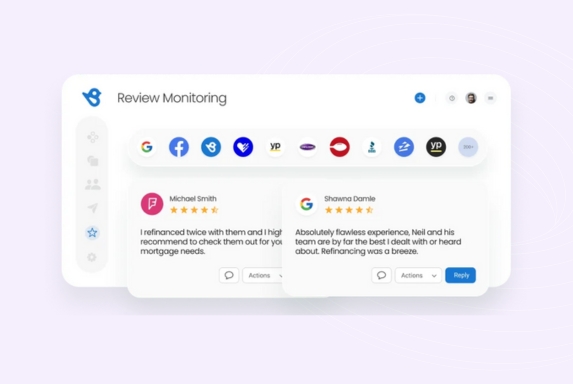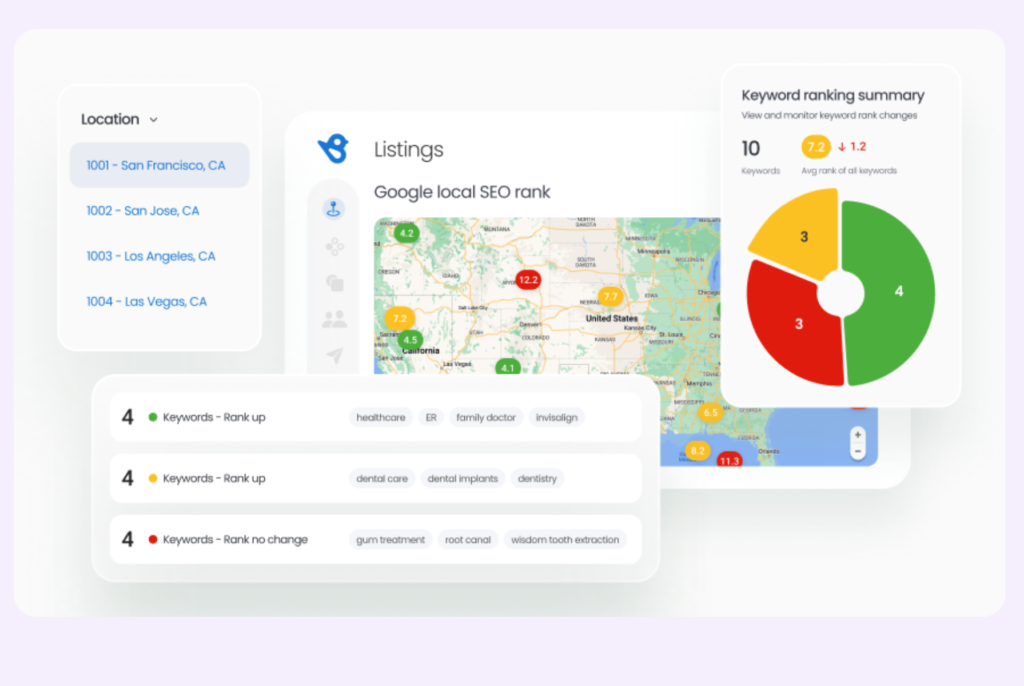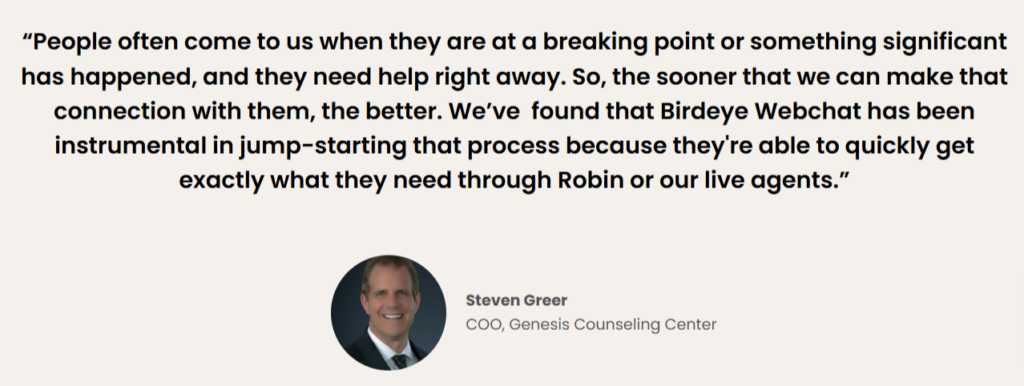While a single negative review can impact customer sentiment, the right online reputation management tools help you monitor, respond, and build trust, ultimately driving revenue. Birdeye’s Online Reviews Report substantiates this, showing that 68% of consumers check online reviews before choosing a local business—making a strong online presence essential.
But here’s the catch: Reputation management isn’t just about tracking online reviews—it’s about taking control of your brand’s online reputation across digital channels.
Not all reputation management tools deliver the same results. In this blog, we’ll explore the 16 best online management tools—helping you understand their unique features, how they benefit your business, and why Birdeye stands out.
Bottom line up front💡
Your brand's online reputation is a business asset. If you’re not actively managing it, you’re leaving it to online reviews, social channels, and customer sentiment to define your brand reputation.
The right reputation monitoring strategy ensures you stay ahead, spot trends, and respond quickly to negative reviews before they turn into potential crises.
Table of contents
- What are online reputation management tools?
- Why Birdeye is the ultimate online reputation management tool?
- Our picks for 16 online reputation management tools, including the #1 choice
- Integrating online reputation management with SEO
- FAQs on online reputation management tools
- Top brands choose Birdeye as their online reputation management tool
What are online reputation management tools?
Online reputation management (ORM) tools are software solutions that help businesses monitor, manage, and enhance their brand reputation across digital platforms. These tools track customer reviews, brand mentions, and sentiment trends to ensure businesses stay in control of their public perception.
Reputation management tools offer several key benefits to businesses, such as:
✔ Reputation monitoring – Track brand mentions, reviews, and feedback in real time.
✔ Sentiment analysis – Identify trends and refine customer experience using AI.
✔ Brand consistency – Ensure listings and messaging are accurate across platforms.
✔ Actionable insights – Leverage data-driven recommendations to improve reputation strategy.
✔ Customer engagement – Strengthen relationships with loyal customers through timely responses and personalized interactions.
✔ Review management – Automate review collection, responses, and engagement.
Benefits of using online reputation management software
Using online reputation management software isn’t just about damage control—it’s about building trust and customer loyalty. Here’s how it benefits businesses:
Safeguards your brand’s credibility
Building a strong brand reputation takes time, but a single negative review can quickly tarnish it. A proactive reputation monitoring strategy helps prevent negative feedback from overshadowing your brand, ensuring trust across social media, review sites, and other digital channels.
Turns customer interactions into opportunities
A well-managed online reputation isn’t just about damage control—it’s about engaging customers at the right moment. By responding quickly to online reviews and feedback, businesses can create positive brand experiences, improve customer loyalty, and foster long-term relationships.
Drives revenue through trust and visibility
Consumers rely on customer sentiment when making purchasing decisions. A strong online reputation backed by positive reviews leads to higher conversion rates, improved business credibility, and ultimately, increased revenue.
Offers real-time insights to outpace competitors
Monitoring review sites, social media, and digital channels helps businesses identify areas of improvement before their competitors do. With Google Alerts and social monitoring, brands gain deeper insights into what customers expect—giving them an edge in optimizing customer experience.
Creates a foundation for sustainable growth
Reputation isn’t just about review management; it’s about long-term strategy. Businesses that consistently monitor online reputation, adapt to trends and engage with their target audience to build a resilient brand image that stands strong amid industry shifts and market fluctuations.
Why Birdeye is the ultimate online reputation management tool?
Managing a brand’s online reputation requires more than just monitoring online reviews—it demands a proactive, AI-driven strategy that improves customer experience, enhances brand visibility, and fuels business growth.
Birdeye is the #1 online reputation management software, providing businesses with a comprehensive suite of GenAI tools to monitor, manage, and enhance their reputation across digital channels.
How Birdeye sets the industry standard?
Unlike generic reputation management tools, Birdeye combines AI-powered insights, automation, and competitive intelligence to deliver unmatched reputation monitoring and control.
✔ Birdeye Reviews AI
Automated review generation, AI-crafted responses, and deep sentiment analysis
- Generate more online reviews effortlessly with automated review requests across Google, Facebook, and 200+ review sites.
- Respond at scale with AI-powered replies, ensuring brand-consistent, timely, and engaging interactions.
- Unlock customer sentiment insights with AI-driven analysis to improve customer experience and brand reputation.

✔ Birdeye Social AI
AI-powered social publishing, engagement tracking, and competitor benchmarking
- Create engaging social content in seconds with AI-generated captions, hashtags, and image recommendations.
- Manage multi-location social media presence from one dashboard, streamlining posts across platforms.
- Track competitor social performance and adjust strategy with AI-powered insights into engagement trends.

✔ Birdeye Listings AI
Ensures listing accuracy, improves local SEO, and boosts brand discoverability
- Keep business listings updated across 50+ directories, including Google, Apple, Facebook, and Bing.
- Boost local SEO rankings with AI-generated keyword insights and listing performance analytics.
- Detect and fix inconsistencies automatically, ensuring 100% listing accuracy at all times.

✔ Birdeye Insights AI
AI-powered data analysis, sentiment tracking, and competitive benchmarking
- Aggregate customer sentiment from reviews, surveys, and social media to understand trends across locations.
- Get AI-powered recommendations on how to improve customer experience and boost brand perception.
- Benchmark performance against industry standards and competitors to identify areas for growth.

✔ Birdeye Competitors AI
Real-time competitor tracking, market benchmarking, and strategy optimization

- Automatically detect local and industry competitors, eliminating manual research.
- Analyze competitor reviews, social media performance, and online presence in real-time.
- Gain a competitive edge with AI-driven insights to outperform rivals in reputation and engagement.
✔ Birdeye Messaging AI
Unified customer messaging, AI chat automation, and multi-channel engagement
- Centralize customer conversations across text, email, webchat, and social media in a single inbox.
- Leverage AI chatbots to handle routine queries, capture leads, and transfer conversations to live agents.
- Automate response workflows, ensuring quick and consistent engagement across all touchpoints.
✔ Birdeye Surveys AI
AI-driven customer feedback collection, sentiment analysis, and experience enhancement
- Create and automate surveys with AI-generated questions tailored to customer insights.
- Analyze responses instantly with AI-powered summaries to identify trends and action points.
- Turn survey feedback into reputation-building opportunities, improving customer satisfaction and loyalty.
Here’s an example of how Birdeye is making a difference for businesses.
How Black Bear Diner transformed its online reputation with Birdeye
Black Bear Diner, a popular restaurant chain, struggled to manage its brand reputation across 150+ locations while ensuring a consistent customer experience. With rising online reviews and social media mentions, they needed a solution to simplify reputation management, engage customers, and boost search visibility.
Black Bear Diner’s three key reputation management challenges
1️⃣ Inconsistent online presence – Inaccurate or outdated business listings on Google, Apple, and other directories hurt local SEO and discoverability.
2️⃣ Review overload and response gaps – Managing a flood of reviews across platforms was overwhelming, leaving negative reviews unaddressed and harming brand reputation.
3️⃣ Lack of customer insights – Without AI-powered analysis, identifying sentiment trends and areas for improvement across locations was a challenge.
The solution: A unified AI-driven reputation strategy with Birdeye
To regain control over its brand’s online reputation, Black Bear Diner implemented Birdeye’s GenAI-suite:
✔ Birdeye Reviews AI – Automated review generation and AI-powered responses, helping them monitor and engage with customer feedback across 150+ locations.
✔ The Birdeye Listings AI – Ensured accuracy and consistency in business listings across Google, Apple, and Bing, boosting local SEO rankings and brand visibility.
✔ The Birdeye Insights AI – Provided sentiment analysis and AI-driven insights, helping them understand customer trends and improve customer experience across locations.
✔ Birdeye Social AI – Centralized social media management, allowing them to engage customers, track conversations, and respond quickly to mentions and reviews.

The results: A stronger, more visible, and trusted brand
After implementing Birdeye’s online reputation management software, Black Bear Diner saw significant improvements:
📈 26% increase in customer reviews, helping them build credibility and trust.
⭐ Higher Google ratings, reinforcing customer confidence and loyalty.
🔍 Enhanced local search rankings, thanks to accurate listings and AI-driven SEO insights.
⚡ Improved response efficiency with faster, AI-powered review monitoring and engagement.

Our picks for 16 online reputation management tools, including the #1 choice
A strong online reputation management strategy requires the right tools. Birdeye is the leading ORM solution, offering AI-powered automation, real-time insights, and a complete suite for managing customer feedback, social media engagement, and local SEO.
However, depending on your business needs, you may explore other tools that specialize in specific areas like text-based reputation management, social listening, or local SEO tracking.
Disclaimer: We’ve included Birdeye in this list because it is the most comprehensive ORM platform, covering review management, competitive insights, social engagement, and listings management—but we’ve also highlighted other tools that focus on specific reputation management functions.
1. Birdeye
Birdeye is the leading intelligent online reputation management tool, designed to help businesses actively shape their reputation—not just react to it. From real-time sentiment analysis to deep competitor insights, Birdeye ensures businesses don’t just monitor their reputation but use it as a competitive advantage.
✅ Why it stands out:
- Predicts trends and provides next-gen reputation insights before issues arise.
- Analyzes sentiment to deliver data-driven feedback for better customer experience.
- Tracks competitors to uncover strengths, weaknesses, and opportunities in real time.
- Seamless integrations with Google, Apple, and 3,000+ platforms for unified ORM

🎯Ideal for: Multi-location businesses, franchises, healthcare, and service-based brands looking for a fully integrated ORM platform. (See the section above for a detailed breakdown of Birdeye’s features.)
2. Podium
Podium is a reputation and communication platform designed to help businesses manage customer interactions through text messaging. With tools for review generation, messaging automation, and payments, Podium simplifies customer engagement.
✅ Features:
- Automated text-based review requests to boost online reputation
- Two-way messaging for customer interactions and lead generation
- Centralized platform for managing Google, Facebook, and Yelp reviews
🎯 Ideal for: Local businesses, retail, and service-based businesses looking for a messaging-first approach to reputation management.
3. Reputation.com
Reputation.com offers an enterprise-grade ORM platform that helps businesses aggregate reviews, competitive benchmark, and analyze customer sentiment across multiple locations.
✅ Features:
- AI-powered reputation analytics and sentiment tracking
- Competitive benchmarking to compare brand reputation
- Custom reporting for enterprise-wide ORM strategies
🎯 Ideal for: Large enterprises and multi-location brands that need a data-driven reputation management approach.
4. Trustpilot
A well-known review platform, Trustpilot specializes in collecting verified customer feedback to improve credibility and transparency for businesses. It allows brands to showcase authentic reviews directly on their website.
✅ Features:
- Verified customer reviews with fraud detection
- Website widgets for embedding trust signals
- Google Seller Ratings integration to improve ad performance
🎯 Ideal for: E-commerce brands and service-based businesses that rely on customer trust and transparency.
5. Brand24
Brand24 is a real-time social listening tool that allows businesses to track brand mentions, analyze sentiment, and measure online reputation across social platforms, news sites, and forums.
✅ Features:
- AI-powered sentiment analysis to track brand perception
- Crisis management alerts for negative feedback
- Competitor monitoring to compare brand engagement
🎯 Ideal for: Brands, PR agencies, and digital marketers who need real-time brand reputation monitoring.
6. Sprout Social
Sprout Social is a social media management platform with built-in ORM tools that help brands monitor mentions, track engagement, and respond to reviews directly from the dashboard.
✅ Features:
- Unified inbox for managing customer interactions
- AI-driven analytics for social media sentiment tracking
- Custom engagement reports for performance measurement
🎯 Ideal for: Brands, agencies, and businesses that prioritize social media reputation management.
7. Yext
Yext focuses on business listing management and local SEO, helping businesses maintain accurate, up-to-date online listings across multiple directories.
✅ Features:
- AI-powered local SEO optimization
- Real-time business listing updates across 50+ directories
- Google Business Profile enhancement tools
🎯 Ideal for: Multi-location businesses, franchises, and retail brands looking to improve local search visibility.
8. ReviewTrackers
ReviewTrackers provides a centralized platform for monitoring, responding to, and analyzing customer reviews. It also offers AI-driven sentiment insights to help brands improve customer experiences.
✅ Features:
- Aggregates reviews from 100+ sources
- AI-powered customer sentiment analysis
- Custom ORM reports for multi-location businesses
🎯 Ideal for: Enterprises, hospitality, and healthcare businesses that want deeper reputation insights.
9. Mention
Mention is a real-time brand monitoring tool that allows businesses to track social media mentions, competitor activity, and industry trends.
✅ Features:
- Web and social media monitoring for brand mentions
- Sentiment analysis for online reputation tracking
- Custom alerts for crisis management
🎯 Ideal for: PR firms, marketing agencies, and corporate brands looking to monitor their brand presence in real time.
10. NiceJob
NiceJob automates review collection, referrals, and reputation marketing to help businesses grow their credibility and customer base.
✅ Features:
- Automated review requests via text and email
- AI-driven social proof widgets for websites
- Customer referral program integration
🎯 Ideal for: Small businesses and service-based industries looking for an easy-to-use review automation tool.
11. Hootsuite
Hootsuite is a social media management tool with powerful social listening and reputation monitoring features that help businesses stay ahead of public sentiment.
✅ Features:
- Brand mention tracking across social media and news sites
- AI-driven social post analytics and engagement monitoring
- Reputation crisis alerts
🎯 Ideal for: Brands, agencies, and enterprises focused on social reputation management.
12. Grade.us
Grade.us provides white-label ORM solutions, making it an excellent choice for marketing agencies managing reputation for multiple clients.
✅ Features:
- AI-powered review response generation
- Custom email and SMS review requests
- White-label options for agencies
🎯 Ideal for: Marketing agencies and consultants managing ORM for multiple businesses.
13. Swell
Swell specializes in reputation and patient engagement solutions for healthcare and dental industries.
✅ Features:
- HIPAA-compliant review management
- AI-powered sentiment tracking
- Automated surveys for patient feedback
🎯 Ideal for: Healthcare providers, dental practices, and medical businesses.
14. Moz Local
Moz Local focuses on local SEO, ensuring businesses have accurate and complete listings across directories and maps.
✅ Features:
- AI-powered business listing optimization
- Local keyword tracking and ranking analysis
- Reputation monitoring for Google and Bing
🎯 Ideal for: Businesses prioritizing local SEO and visibility.
15. ReviewPush
ReviewPush helps multi-location businesses consolidate and manage customer reviews from multiple platforms.
✅ Features:
- AI-driven review sentiment analysis
- Auto-tagging of customer feedback trends
- Location-based review insights
🎯 Ideal for: Retail chains, franchises, and service-based businesses.
16. SOCi
SOCi is an all-in-one marketing and reputation management tool designed for multi-location businesses looking to optimize brand engagement across platforms.
✅ Features:
- Multi-location review tracking and response management
- AI-driven brand sentiment monitoring
- Social media reputation management
🎯 Ideal for: Franchises, hospitality, and retail brands looking for centralized ORM management.
While some ORM tools focus on specific areas like social media engagement, review generation, or listings management, Birdeye stands out as the only all-in-one solution that integrates AI-driven insights, review automation, local SEO, competitor analysis, and multi-location management under one platform.
Businesses looking for a single, powerful tool that does it all choose Birdeye.
If you aspire the same outcome, schedule a demo today.
Integrating online reputation management with SEO
A strong online reputation isn’t just about building customer trust—it also directly impacts search engine rankings. Google considers review quantity, frequency, and sentiment as key ranking factors, making online reputation management a critical part of any SEO strategy.
So, what’s the interplay between reputation and search rankings?
✅ Online reviews improve local SEO rankings
Google’s algorithm favors businesses with frequent, high-quality reviews. Businesses that encourage customers to leave reviews see higher rankings on Google Maps and local search results.
✅ Business listings impact discoverability
Accurate Google Business Profiles, listings on Apple Maps, and Bing Places ensure that search engines trust a business’s location data. Inconsistent or outdated listings can harm brand credibility and rankings.
✅ User-generated content boosts domain authority
Customer-generated reviews, testimonials, and case studies act as fresh, keyword-rich content that signals credibility to search engines, increasing organic visibility.
Case study: How Genesis Counseling Center boosted SEO through reputation management
Genesis Counseling Center, a multi-location mental health practice, struggled with limited online visibility and inconsistent business listings across directories. They needed a solution that would strengthen their online reputation, improve local SEO rankings, and drive patient engagement—and they found it with Birdeye.
Challenge
🔹 Inaccurate business listings – Discrepancies across Google, Apple, and Bing were negatively affecting their local search rankings and patient discoverability.
🔹 Lack of structured market research – Despite high patient satisfaction, they lacked actionable insights to measure how reviews impacted SEO performance.
🔹 Competitive disadvantage – Other counseling centers had stronger online reputations, making it difficult for Genesis to stand out in local search results—a challenge many brands face.

How Birdeye helped
- With Birdeye Reviews AI, Genesis automated review collection, making it easier for satisfied patients to leave Google reviews. This increased their review volume and recency, two key factors in Google’s local search algorithm.
- Birdeye Listings AI corrected and standardized business information across Google Business Profile, Apple Maps, and directories, boosting local SEO rankings and brand credibility.
Overall, Birdeye’s online reputation monitoring tools provided real-time insights into patient feedback, enabling Genesis to respond quickly and improve engagement.

📌 The results?
✅ Increased Google reviews by 108%, strengthening their online reputation and SEO rankings.
✅ Higher placement in Google Maps, leading to more appointment bookings.
✅ Consistent business listings across all individual locations, eliminating ranking discrepancies.
Genesis Counseling Center’s success proves that integrating online reputation management with SEO is not optional—it’s essential. Businesses that actively generate reviews, manage listings, and respond directly to feedback not only build credibility but also gain a competitive edge in local search rankings.
FAQs on online reputation management tools
No, ORM tools can’t remove genuine negative customer reviews, but they help mitigate their impact. AI-powered solutions monitor brand sentiment, alert businesses in real-time, and enable quick responses. Some of the best tools also assist in flagging fake or inappropriate reviews for removal.
No, ORM tools can’t remove genuine negative reviews, but they help mitigate their impact. AI-powered solutions monitor brand sentiment, alert businesses in real-time, and enable quick responses. Some of the best tools also assist in analyzing all the data to flag fake or inappropriate reviews for removal.
AI-powered ORM tools provide real-time alerts for reputation risks, allowing businesses to address issues before they escalate. Crisis response is one of the many benefits of using these platforms, as they enable internal teams to track negative brand mentions and respond strategically.
Yes! ORM tools aren’t just for businesses—entrepreneurs, influencers, and executives can track personal brand mentions, manage online reviews, and monitor social media perception. Choosing the best tools ensures brand credibility, helping individuals build a strong and trusted digital presence.
AI automates review monitoring, sentiment analysis, and competitive benchmarking, reducing manual effort. It suggests optimal responses to reviews, detects emerging trends, and predicts potential brand crises. AI-driven ORM tools adapt to business needs, ensuring brands stay ahead in managing customer perceptions.
Top brands choose Birdeye as their online reputation management tool
Leading businesses trust Birdeye’s GenAI platform because it’s more than just an online reputation management tool—it’s an AI engine that monitors, manages, and enhances brand credibility at scale.
Trusted by 150K+ businesses, Birdeye delivers the most comprehensive online reputation management solution for brands that want to dominate search rankings, extract internal data that ensures businesses get the deep dive insights into their reputation trends and increase customer trust.

This blog post is part of our Online Reputation Management Guide:
Online Reputation Management
- Reputation management companies
Originally published






![[Feature image] The best AI tools for business in 2025 A complete guide for productivity, content, and growth](https://birdeye.com/blog/wp-content/uploads/Feature-image-The-best-AI-tools-for-business-in-2025-A-complete-guide-for-productivity-content-and-growth-375x195.jpg)


